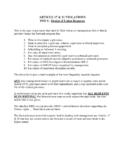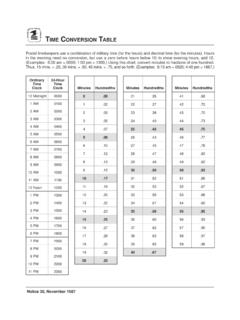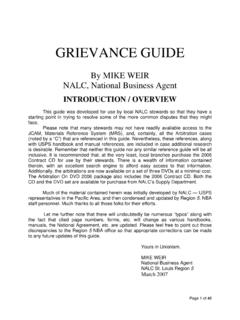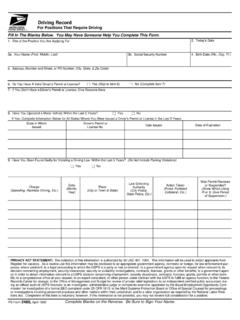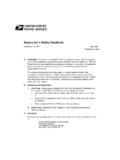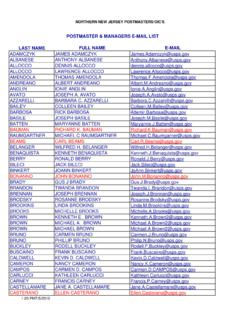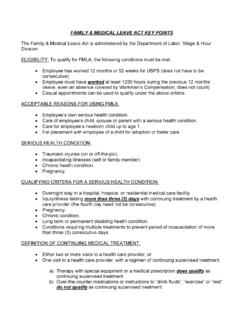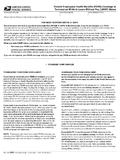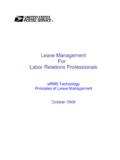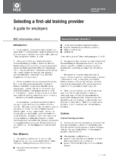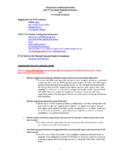Transcription of Duty to Provide Information to the Union in …
1 To arrange for this or any other training for Supervisors course, or to ask about legal issues raised by the course materials, contact the Law Department Field Office that serves your office or facility. See the Law Department Field Office listings on our Web site at blue/uspslaw. training for Supervisors duty to Provide Information to the Union in Grievance Matters October 2002 Prepared by the Law Department United States Postal Service uspslaw L A W DEPARTMENT. Visit the Law Department Web site at blue/uspslaw for course and reference materials, directory listings, publications, and more. This publication is intended only for internal training purposes and as a general reference to be used in conjunction with training sessions conducted by the Law Department. It is not equivalent to an official handbook, manual, or policy statement, and may contain representations that are subject to interpretation and potential change in the law. All examples are intended as teaching exercises and not as representations of actual Postal Service events or practices.
2 training for Supervisors duty to Provide Information to the Union in Grievance Matters CONTENTS. A. General principles .. A - 1. Sources of obligation .. A - 1. What Information must be provided .. A - 1. Requirements .. A - 1. Request .. A - 2. Relevant Information .. A - 3. Continuing nature of duty .. A - 4. Time for complying .. A - 5. B. Information that is presumed relevant .. B - 1. Presumption of relevance .. B - 1. Overcoming the presumption .. B - 1. When the relevance is questionable, question .. B - 2. C. Certain Information is not presumed relevant .. C - 1. Matters excluded from grievance process .. C - 1. Employees not represented by requesting Union .. C - 2. Postal hiring practices .. C - 2. Moot grievance .. C - 2. 10/2002. training for Supervisors duty to Provide Information to the Union in Grievance Matters CONTENTS continued D. Privilege and confidentiality concerns .. D - 1. Exercise caution .. D - 1. Privileged Information .
3 D - 1. Confidential Information .. D - 2. Accommodating confidentiality concerns and Information needs .. D - 3. E. The magnitude and cost of Information requests .. E - 1. Both parties' duty .. E - 1. Limits on fishing expedition .. E - 1. Limits on costs to USPS .. E - 2. Nonlocal requests .. E - 3. F. Practical advice .. F - 1. G. Checklist .. G - 1. 10/2002 ii training for Supervisors duty to Provide Information to the Union in Grievance Matters A. General Sources of obligation principles Sources of principles: # National Labor Relations Act # Collective bargaining agreement What Information must be provided Management must Provide Information to a requesting Union when required by: 3 the collective bargaining agreement ("contract"). 3 or the National Labor Relations Act ("NLRA"). + Although the contract and the NLRA. largely overlap, one sometimes does impose obligations upon management that the other does not. Requirements 3 Request 3 Potentially relevant Information 3 Continuing nature of duty to respond 3 Time for complying with request 10/2002 A-1.
4 training for Supervisors duty to Provide Information to the Union in Grievance Matters A. General Request principles # A request must be made. (cont'd). C Under the NLRA, no duty to Provide a Union Information arises until a request or a demand has been made. C AVEAT: Even prior to a request, management has the duty to develop and disclose relevant facts. # Once a request is made, both Union and management .. must develop "all necessary facts, including the exchange of copies of all relevant papers or documents in accordance with Article 31.". Article 2(d) of major National Agreements + A Union may request Information .. # to investigate an existing grievance and .. # to investigate a matter in order to determine whether or not to bring a grievance. + The NLRB's definition of Information necessary to process grievances is much broader than the definition under the collective bargaining agreement. 10/2002 A-2. training for Supervisors duty to Provide Information to the Union in Grievance Matters A.
5 General Relevant Information principles Management must almost always Provide (cont'd) a Union with .. # requested Information .. # that is potentially relevant in the investigation of .. C a grievance .. C or a possible grievance. + What is relevant: A document is relevant when it reasonably .. # could contain useful Information .. # or could lead to useful Information . A supervisor's disagreement as to a document's relevance does not necessarily make the document irrelevant to the Union , nor Provide a valid reason not to disclose it. The Union needs to show that the document is possibly relevant to its pending or potential grievance. When an Information request includes a demand for both relevant and irrelevant Information : 3 the whole request cannot be denied;. 3 management must Provide the Information that is relevant. 10/2002 A-3. training for Supervisors duty to Provide Information to the Union in Grievance Matters A. General Relevant Information (cont'd).
6 Principles + As examined below in Part D, (cont'd) confidentiality concerns and claims of privilege may affect how or even whether relevant Information is disclosed. Continuing nature of duty duty to respond to Information requests is continuing. Management still has duty to respond to Information requests at further stages of grievance process (Step 3, arbitration). 10/2002 A-4. training for Supervisors duty to Provide Information to the Union in Grievance Matters A. General Time for complying principles Timeliness: Management has an (cont'd) obligation to respond to an Information request in a timely manner. + What is timely? # No concrete guidelines: 3 Depends on situation and reason 3 Delay of a few weeks may violate NLRA. # Apply a rule of reason to difficult requests. 3 Examples: Archived Information , voluminous Information , Information requiring the aid of individuals on vacation, etc. + Unnecessary delay in completing an Information request will result in the filing of an unfair labor practice charge with the National Labor Relations Board.
7 # Therefore, all requests must be promptly answered, and in all cases must be answered within 21 days. # If a longer period of time is needed, a letter should be sent to the requesting party explaining the reasons for the delay. 10/2002 A-5. training for Supervisors duty to Provide Information to the Union in Grievance Matters B. Information Presumption of relevance that is Certain Information is presumed to be presumed relevant. This means: relevant + Unless management has a good reason for not disclosing it, it must be provided to the Union upon request. Presumed to be relevant Information : C pertaining to the wages, hours, and working conditions .. C of individuals represented .. C by the requesting Union . Overcoming the presumption # The presumption of relevance can be defeated. # The burden is upon management to show: C that the Information requested, .. C even though it concerns individuals represented by the Union , .. C is in fact irrelevant.
8 10/2002 B-1. training for Supervisors duty to Provide Information to the Union in Grievance Matters B. Information When the relevance is questionable, question that is presumed When the relevance of requested Information is not obvious or apparent, relevant (cont'd) it is proper, wise, and safe to: 3 first ask the Union , in writing, to explain the relevance of the Information sought When the request is unclear: 3 ask the Union , in writing, for clarification as to the nature of its request;. 3 do not deny the request merely because the relevance of the Information requested is unclear. 10/2002 B-2. training for Supervisors duty to Provide Information to the Union in Grievance Matters C. Certain Certain Information is generally presumed to be not relevant Information is not presumed # Information about matters which are not grievable because they are relevant excluded from the grievance procedure # Information about employees not represented by the requesting Union C AVEAT: In some matters, , a jurisdictional dispute between unions concerning work assignments, or claims of more favorable discipline of a supervisor, this Information may be clearly relevant.
9 # Information about postal hiring practices # Information relating to a grievance matter that has become moot Matters excluded from grievance process # Information about matters .. C that are not grievable .. C because those matters are excluded from the grievance procedure ( , probationary employees). 10/2002 C-1. training for Supervisors duty to Provide Information to the Union in Grievance Matters C. Certain Employees not represented by requesting Union Information is not presumed # Union carries the burden to show the Information and documents are relevant (cont'd) relevant; only if it meets that burden is there an obligation to disclose. Postal hiring practices # Information about postal hiring practices + unless .. 3 the Union indicates that it is investigating .. 3 and the requested Information is relevant in determining .. 3 whether there is EEO-type discrimination operating in those matters. Moot grievance # Information relating to a grievance matter that has become moot.
10 Moot = no longer remains an issue that can be remedied in the grievance procedure After a grievance matter has become moot, there is no duty to produce Information about that grievance. 10/2002 C-2. training for Supervisors duty to Provide Information to the Union in Grievance Matters C. Certain Moot grievance (cont'd). Information is 3 Example: If a discipline grievance is not presumed settled, a later request going to the basis for the discipline need not be relevant (cont'd) honored, due to mootness. C AVEAT: If the request is relevant when made, but later becomes moot, delay in providing the Information may nonetheless violate the NLRA. + Keep in mind: # What may appear to be a clearly winning procedural defense ( , timeliness) or a winning defense on the merits ( , the contract clearly does not say what the Union contends) will not render a matter irrelevant. The Union has the right to make its full case, and to conduct a relevant investigation in order to do so.
